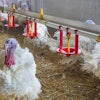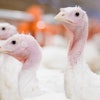U.K. consumer demand for organic chicken increased in 2014, creating a mood of increasing confidence among producers in what is now a more stable market, says organic food and farming charity The Soil Association.
According to the Soil Association Organic Market Report 2015, U.K. organic poultry production last year remained at similar levels to 2013. However, this was because additional demand for organic poultry meat was met by a surplus supply of birds, produced as a planned contingency, rather than by increased production.
Consequently, a smaller proportion of organic birds were sold as free range, or through the wholesale market.
Growing conditions were favorable for organic poultry production last year, enabling birds to be consistently produced up to a live weight of 2.4 kg. Feed prices, however, remained challenging, but had eased by around 5 percent from January 2014 levels by the end of year.
Organic egg production
Sales of organic eggs in the U.K. increased by 15.8 percent in 2014, and now account for 6 percent of all egg sales. Demand was particularly strong in the second half of the year, with sales in December up by 20.4 percent on December 2013.
Although production has picked up in response to demand, it needs to increase further to ensure good availability on shelf throughout 2015, The Soil Association says.
Department for Environment, Food and Rural Affairs (Defra) statistics show that 474,000 cases of organic eggs were produced in the first nine months of 2014 - a 2.5 percent increase on the same period in 2013.
To meet consumer demand, a sharp increase in production will be required in 2015, but a number of producers have dropped out of organic production in the past three years because of lower demand, the prospect of increased costs associated with new European Union standards.
Yet based on data collected in December last year and January 2015, The Soil Association reports that 76 of wholesalers surveyed, 67 percent of retailers and 63 percent of organic businesses anticipate increased organic sales in 2015, and that the outlook for organic food is more positive than it has been for many years.
Predictions from the multiple retailers, however, are varied, partly reflecting the mixed year these outlets have had. Price pressure reducing the broader market’s focus on premium food is a key factor, but a conscious reprioritization of organic is also evident among some retailers.
Strong intent to buy more organic poultry products
Dairy remains the strongest organic sector in the U.K., but a survey of supermarket consumers found that 54.8 percent intended to buy more organic fruit and vegetables, while 33.8 percent said that they would buy would buy more organic chicken, with the same number expressing an intention to buy more organic eggs.
The top five reasons cited by consumers for buying organic food were: no pesticides, better taste, better for the environment, better for animal welfare, and perceived health benefits.
Overall, the UK food market contracted by 1 percent last year. Sales of organic food, however, grew by 4 percent to be worth GBP1.86 billion (US$2.87 billion). The strongest growth in organic purchases was through online shopping, box schemes and independent retailers.

















